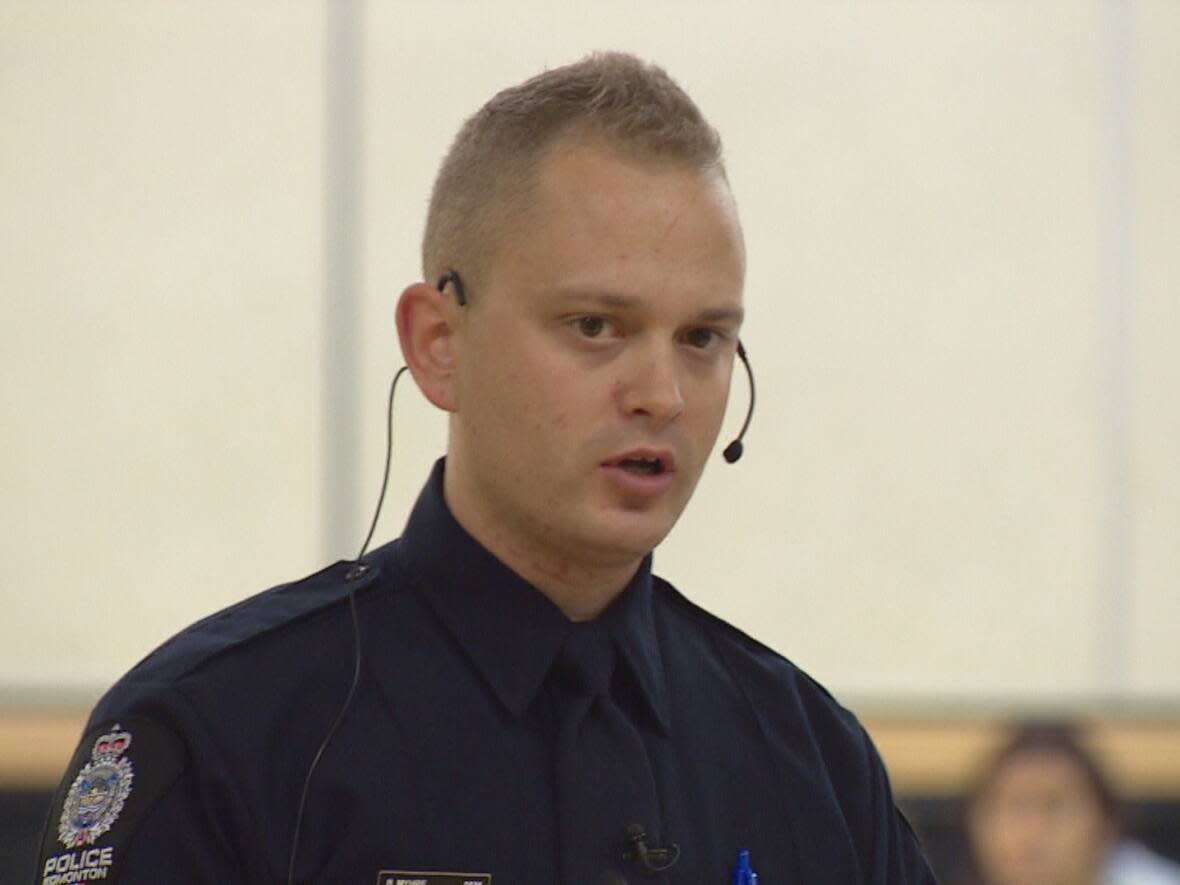Students, staff want police officers to stay in Edmonton Catholic Schools, study finds

Edmonton's Catholic school board and the Edmonton Police Service say they're committed to keeping and improving a decades-old program that stations officers in schools.
On Wednesday, the school board released a report from three criminologists who spent 18 months reviewing the school resource officer (SRO) program.
Through interviews, focus groups and surveys, they found the majority of division staff, students and their parents said they wanted to keep SROs.
"They are a valuable asset and are critical to our overall support that we offer our students and families," chief superintendent Robert Martin said at a school board meeting Wednesday. "Clearly, our students, parents and staff see the value of the program and want it to continue."
Police officers working out of schools have come under increased scrutiny in Canada in recent years.
Edmonton police have often touted the benefits — the officers volunteer to coach sports teams, counsel students and can respond quickly to school emergencies.
However, some former students and critics say students who are Black, Indigenous, people of colour, LGBTQ, or have disabilities can feel intimidated and targeted by police.
In September 2020, Edmonton Public Schools paused its SRO program, months after dozens of speakers asked that the program be shut down.
Critics often cite research suggesting students of colour are more likely to face criminal charges than their white classmates when apprehended by school-based police.
Edmonton Catholic Schools opted to review its program, but keep it running. Thirteen officers work in 17 junior and senior high schools across the city.
The division hired three criminology professors: Kanika Samuels of Carleton University, Scot Wortley of the University of Toronto and Sandra Bucerius of the University of Alberta.
For a $137,000 fee, the trio spent 18 months holding focus groups, conducting interviews, and surveying thousands of Edmonton Catholic students, staff and parents. They also looked at nearly 2,300 division records of student interactions with SROs over 11 years.
The surveys found the majority of staff, students and parents wanted the SRO program to stay — although many wanted improvements. About three per cent of staff said the division should terminate the SRO program, as did two per cent of parents, and less than two per cent of students.
Although a minority of students said they felt intimidated or targeted by the officers, a larger proportion of Black and Indigenous students felt uneasy.
The researchers also found some frustrations and limitations. Respondents wanted less turnover of the officers and an easier way to replace police that were a poor fit with the school.
The school division's patchy records of students' interactions with SROs also frustrated the researchers.
Although Edmonton police Chief Dale McFee said he was pleased to see only five per cent of student transgressions resulted in criminal charges, records of outcomes were missing for more than 20 per cent of the cases.
School board accepts recommendations
Samuels, Wortley and Bucerius recommended better record keeping — including the collection of race-based data of students interacting with SROs.
They also said schools should have more input into selecting their SRO, that officers should find more ways to respond to rule-breaking that avoid arrests and laying charges, and that SROs should spend more time on the job in plainclothes without their weapons.
McFee said he wants to see officers find more ways to divert students away from facing criminal charges for wrongdoing.
"I want to also thank the board for their courage – not to jump to conclusions but to take us down a path where we actually can look at what improvement looks like," McFee said.
Martin said it was too early to give timelines for when the school division and police would make the recommended changes.
Edmonton Public Schools has also hired Samuels, Wortley and Bucerius to retrospectively review its SRO program, and are expected to submit their report by November, a division spokesperson said.


